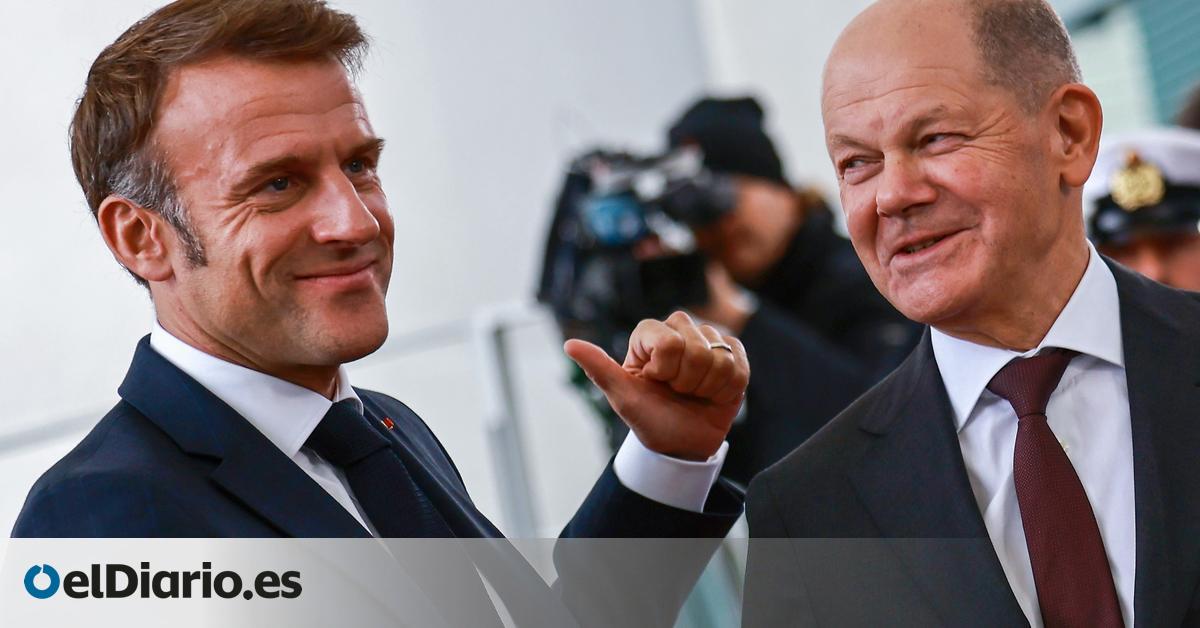
They are the two great economies. The two lighthouses that guide the EU. But the once powerful Franco-German axis is beginning to crack. And it does so when the continent is in the middle of a geopolitical gale with the war in Ukraine entering a new phase that points to negotiation, the return of Donald Trump to the White House and the intensification of the trade war, also with China . All this while the EU fights not to be left behind and to strengthen its competitiveness. The political crises in France and Germany threaten to weigh down the EU at a delicate time.
First was the collapse of the German Government, which has now entered ‘electoral mode’ until next February 23. The tripartite led by the social democrat Olaf Scholz became an unpredictable partner for the EU with swings in some policies, such as the different positions regarding the shipment of weapons to Ukraine or the blockade that it imposed on the ban on the sale of diesel cars and gasoline from 2035. That was a transfer (albeit temporary) to one of its key industries at a time when, in addition, Europe’s locomotive was beginning to seize up after decades of lack of investment. The economy contracted by 0.3% in 2023 and the forecast for this year is that it will contract by 0.1%, which would be the second year with negative growth.
Added to this is the chaos in which French politics finds itself after Emmanuel Macron’s decision to look to the extreme right when forming the new Government, which has set a short-lived record by triumphing in the motion of censure without having completed its first 100 days. France is not exactly in a good moment from a fiscal point of view. In addition to having one of the highest debt ratios in the eurozone, its deficit is expected to increase to 6.2% – more than double the figure stipulated in the eurozone for healthy accounts – and the path of descent will be slow , according to estimates by the European Commission.
“Spending cuts due to austerity measures created significant pressure on both the French and German governments during their budget negotiations. This occurs at a time when investments in the clean technology sector and the decarbonization of the industry should increase dramatically to reinforce competitiveness and prosperity,” explains Linda Kalcher, executive director of the political crises in those two countries. think tank Strategic Perspectives.
Spain, convinced that turbulence will be overcome
In economic terms, Pedro Sánchez’s Government does not expect there to be a contagion effect to other countries, and especially in the case of Spain, which has become the advantaged student, being the eurozone economy with the highest growth forecast. coming years. “Absolute tranquility,” say sources from the Ministry of Economy, who point out that investors focus on “the economic fundamentals” of each country and “there is complete confidence” in the case of the Spanish markets.
Furthermore, these sources maintain that Spain’s growth as the EU’s “main economic engine” in recent years has occurred in a context in which the rest of the partners were not exactly “buoyant.” “The better our neighboring countries do, the better it will be for us; But we are perfectly capable of maintaining this growth and this market confidence,” these sources point out. Nor do the European Commission show extra concern about the situation, although the lack of budgets complicates compliance with the fiscal path agreed with Paris.
But in times of tribulation, stability is invaluable. And that is where the Paris-Berlin axis, which is traditionally the one that pulls the strings of European decisions, weakens, weighing down the community club at a time when they have to make decisive decisions for the future, such as preparing for the return of Trump or the debates on the Clean Industrial Pact with which the European Commission aims to strengthen the industry. Scholz, who has a difficult time remaining at the helm, and Macron, who has to re-form a government and remains knocked out after two consecutive defeats, have enough problems at home to pay attention to the European debates.
“With the new European Commission and the new president of the European Council, António Costa, there will once again be firmer direction from Brussels. “The weakened governments of Germany and France can be compensated if their leaders step forward for a unified European response to the incoming Trump administration, the investment gap and the race for competitiveness with China,” reflects Kalcher on the opportunity. that Macron and Scholz can find.
For the moment, in the midst of her anxiety, Ursula von der Leyen emerges as a figure of power and consensus in the EU. After weeks of tension between popular and socialists over the final composition of the European Commission due to the inclusion of the extreme right in a vice presidency with the Italian Raffaele Fitto, and the PP campaign of Alberto Núñez Feijóo against Teresa Ribera, the community government has thrown out to walk, although he has done so with the least support in history. Von der Leyen knows that she is in control.
In fact, he has not hesitated to get on a plane to try to sign the agreement with Mercosur that he had been resisting for decades. The trip takes place in full political catharsis in France, which is one of the countries that leads the opposition to this trade text due to the consequences it would have for the European agricultural sector.
“There are political events in our member states and there are negotiations on trade or association agreements that the European Commission carries out with a mandate from our member states,” responded the spokesperson for Community Trade, Ollof Gill, to repeated questions from journalists. about the possible closing of that agreement with the rejection of Paris.
“If the French do not want the agreement, they do not decide anything else, it is the European Commission who decides,” said the president of Brazil, Lula Da Silva, last week. A long time ago it would probably have been unthinkable to make a decision of this magnitude without the approval of France or Germany.
The risk of the rise of anti-Europeanism
If previously Italy and Spain were the large countries accustomed to instability, with four prime ministers between 2014 and 2022 in the Italian case, and several electoral repetitions in the Spanish case, now the tables have changed. And while waiting for a new leader to arrive at the German Chancellery and when Macron’s career is heading towards its end, the storm is in Berlin and Paris, while Pedro Sánchez and the far-right Giorgia Meloni remain without major shocks. Eyes are also on the Polish Prime Minister and former President of the European Council Donald Tusk, from the European People’s Party family.
Another of the great fears in each election held in the EU is the rise of far-right and anti-European forces. And it is a danger that hovers both in Germany, where the Alternative for Germany ultras have recently obtained historic results in regional elections, and in France, where the left-wing coalition won the last legislative elections, but Marine Le Pen has an electorate increasingly stabilized.
Source: www.eldiario.es

